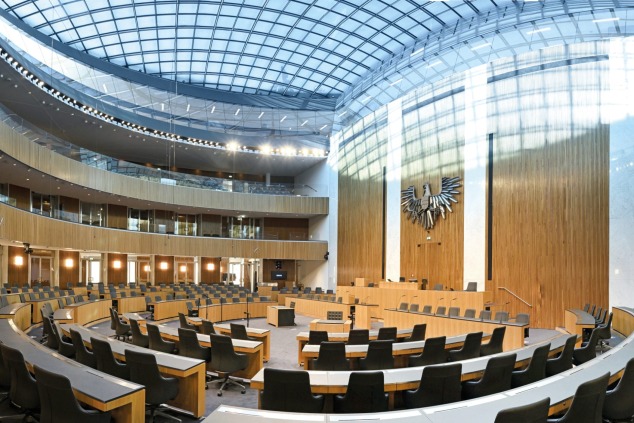Zwei Wochen vor der Nationalratswahl spricht der FORWIT Empfehlungen für die FTI- und Wissenschaftspolitik der nächsten Bundesregierung aus.
In der kommenden Legislaturperiode müssen erfolgreich begonnene Anstrengungen zur Stärkung der Leistungsfähigkeit des österreichischen FTI-Systems fortgeführt und intensiviert werden, um das System vorausschauend und konsequent weiterzuentwickeln. Das hält der Rat für Forschung, Wissenschaft, Innovation und Technologieentwicklung (FORWIT) in seiner Empfehlung fest.
Wie alle Länder ist Österreich mit globalen Entwicklungen und Herausforderungen konfrontiert, deren Bewältigung eine hohe systemische Anpassungsfähigkeit erfordern. Um gesellschaftlich und wirtschaftlich resilient zu sein, und agil und rasch auf neue Herausforderungen reagieren zu können, spielen Forschung, Technologie und Innovation eine entscheidende Rolle. Sie sind unerlässlich, um Freiheit, sozialen Frieden und Wohlstand langfristig zu sichern.
Resilienz, Agilität und Anpassungsfähigkeit deutlich steigern
Wenn jetzt nicht mutige Verbesserungen angegangen werden, fallen Österreich und Europa zurück.
Thomas Henzinger
„Im europäischen Vergleich ist Österreichs Position in Forschung, Wissenschaft und Innovation befriedigend, aber aus globaler Sicht zeigt sich ein dramatisches Bild. Wenn jetzt nicht mutige Verbesserungen angegangen werden, fallen Österreich und Europa zurück“, warnt Thomas Henzinger, Vorsitzender des FORWIT. „Ziel muss es sein, die Resilienz, Agilität und Anpassungsfähigkeit des Systems zu erhöhen, um effektiv mit unvorhersehbaren Herausforderungen und Krisen umgehen zu können“, so Henzinger.
Daher hat der Rat heute umfassende Empfehlungen für die FTI- und Wissenschaftspolitik einer Bundesregierung in der XXVIII. Legislaturperiode vorgelegt. Darin werden zwölf Handlungsfelder thematisiert, die der FORWIT als besonders dringlich erachtet, und Maßnahmen vorgeschlagen, die dazu beitragen können, diese Bereiche wirksam zu gestalten.
Innovationsdruck von vier Seiten
Österreich steht vor vier großen globalen Herausforderungen, die durch Forschung und Innovation gemeistert werden können: die neuen digitalen Technologien – allen voran Künstliche Intelligenz–, die Transformation zur Nachhaltigkeit, die volatile äußere Sicherheitslage sowie das fragile gesellschaftliche Vertrauen in Wissenschaft und Demokratie. Um diesen disruptiven Entwicklungen gezielt und effektiv begegnen zu können, braucht es eine Stärkung des österreichischen FTI-Systems.
Gelingen kann dies etwa durch die Gründung eines nationalen Kompetenzzentrums für Künstliche Intelligenz, das Österreichs „KI-Literacy“ befördert. Modellhafte Zero-Emission-Transformationszonen können als rechtliche „Sandboxes“ den regulatorischen Freiraum schaffen, innovative klimaverträgliche Technologien unter realen Bedingungen zu testen. Außerdem empfiehlt der FORWIT den Aufbau einer schlagkräftigen Behörde für Foreign Interference und hybride Bedrohungen sowie die Einrichtung integrierter Wissenschafts- und Demokratielabore („Future Labs“) in jedem Bundesland.
Voraussetzungen für erfolgreiche Forschung und Innovation
Um Forschung, Wissenschaft und Innovation in Österreich erfolgreich zu fördern, muss Österreich eine chancengerechte und moderne Bildung sicherstellen und sich zu einer Drehscheibe für globale Fachkräfte entwickelt. Nicht zuletzt muss verstärkt privates Kapital für Forschung und Innovation mobilisiert werden, um ein zukunftsfähiges FTI-System zu gewährleisten.
Die Empfehlungen des FORWIT schlagen dazu unter anderem ein durchgehendes Pflichtfach Informatik, die Einrichtung eines „Austria College“ für talentierte Studierende aus Drittländern und einen Dachfonds zur Erhöhung der Risikokapitalintensität, die insbesondere für Start-ups und die Skalierung von Unternehmen von hoher Relevanz ist, vor.
Vier Ziele für eine Erneuerung des FTI-Systems
Um die Effektivität von Wissenschaft und Forschung in Österreich zu steigern, benötigt das FTI-System eine gezielte Diskussion darüber, wie es sich erneuern kann. Aus Sicht des Rates gehören dazu die Ziele, dass die Regelstudiendauer an Hochschulen zum Normalfall und ein international kompatibles Karrieremodell für das Hochschulpersonal auch tatsächlich gelebt werden. Die Finanzierung von Forschung und Innovation soll unter dem Gesichtspunkt der Autonomie für Forschungsförderer und -träger organisiert werden. Zugleich gilt es, leistungsabhängige Anreize innerhalb der Forschungsfinanzierung weiter auszubauen.
Europas und Österreichs globale Relevanz schrumpft
Die nächste Bundesregierung sollte nicht nur klar für einen starken FTI-Standort Österreich, sondern auch für einen starken FTI-Standort Europa eintreten.
Sylvia Schwaag Serger
Die Empfehlungen des FORWIT richten sich zwar an die nächste Bundesregierung Österreichs, können aber ohne Europa nicht gedacht werden. „Wir sehen, dass die Bedeutung Europas – und damit auch Österreichs – auf globaler Ebene abnimmt. Wirtschaftlich und technologisch verliert die EU zunehmend an Relevanz und ihr Anteil an der globalen Forschungs- und Innovationslandschaft schrumpft. Daher sollte die nächste Bundesregierung nicht nur klar für einen starken FTI-Standort Österreich eintreten, sondern auch für einen starken FTI-Standort Europa – und sich aktiv in dessen Gestaltung einbringen“, appelliert die stellvertretende Ratsvorsitzende Sylvia Schwaag Serger.



 EmDee
EmDee




